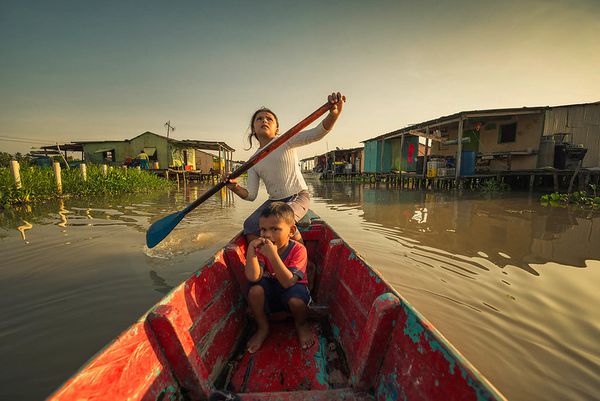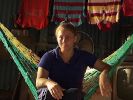Eye For Film >> Movies >> Once Upon A Time In Venezuela (2020) Film Review
Once Upon A Time In Venezuela
Reviewed by: Amber Wilkinson

The village of Congo Mirador on Lake Maracaibo, in Venezuela, is entirely built on stilts, with the houses just inches above the water, so that everywhere you look there is reflection - captured with artistic verve by day and night by director Anabel Rodriguez Rios and Bad Hair cinematographer John Márquez. But we will come to learn it is more than just the skies above and the famous 'thunderless' Catatumbo lightning that are reflected in this tiny fishing settlement because although it may be a remote arm of the Venezuelan body politic, it mirrors a political and environmental malaise that is coursing through the veins of the country.
Even here, in a place that has only a few hundred souls, the modern global phenomenon of tribal, combative politics is very much in evidence. The two halves of the coin are represented by Tamara, a middle-aged leader of the Chavist party - whose love for Hugo Chavez is enduring and extends to turning her bedroom into what amounts to a shrine - and younger teacher Natalie, who supports the opposition. Elsewhere in the village, we meet an old-timer who sings canciones of love and longing from his youth, in between chasing teenagers away from his pelican, and Natlie's young daughter Yoaini and her friends as they go about their daily adventures.

What emerges is a tapestry of ages and life that though it hasn't changed much down the years now faces an existential threat from sediment, which is building up, choking the water and providing a breeding ground for rats, snakes and disease. More than two million barrels of oil are also extracted from the lake every day and we see evidence of the pollution at key points in the film. The townsfolk lobby for a dredger without much hope, as a picture emerges of votes as a transactional entity, to be bought and sold for food, phones or cash.
Rios is an attentive observer, whether she's capturing the kids shell diving or splashing about - with Márquez displaying a looseness with the camera that echoes their energy - or observing Tamara's political machinations over the telephone. She is quite the character, with no small sense of her own importance, a power she attempts to wield at Natalie's expense, branding her uncaring even though we can see with our own eyes that this is far from the truth. The film, shot over seven years, gradually takes shape around the election cycle and the controversy around current president Nicolás Maduro - accused of vote rigging and worse. Rios doesn't waste time explaining the political backdrop and, in truth, she doesn't have to as we can see Tamara and others doing everything she can to swing the election, a microcosm of the wider situation. Meanwhile, Natalie considers whether exile may be the best option - she certainly wouldn't be the first and it's poignant to see various houses being floated off to new locations as sediment begins to seize up the village.
Away from the immediate politics, Rios also considers the situation for young girls in the country, in particular. Marriage is often early - one girl's sister was married at 13 and had a child less than a year later - and many of the youngsters are as much a portrait of misery and fear as they are excited as they find themselves "dolled up" for a pageant that feels more like a cattle market than a celebration. The seven-year time span allows change to be visible to the naked eye. Where once was water, now plants grow, while it is the villagers who have retreated in numbers. Tamara and Natalie may view one another as adversaries but in fact they are both up against the power of nature and the nature of wider political power that only cares about power itself.
Reviewed on: 28 Oct 2020















